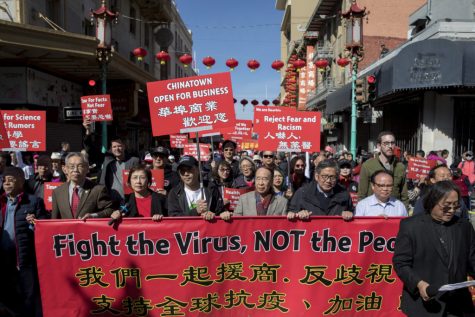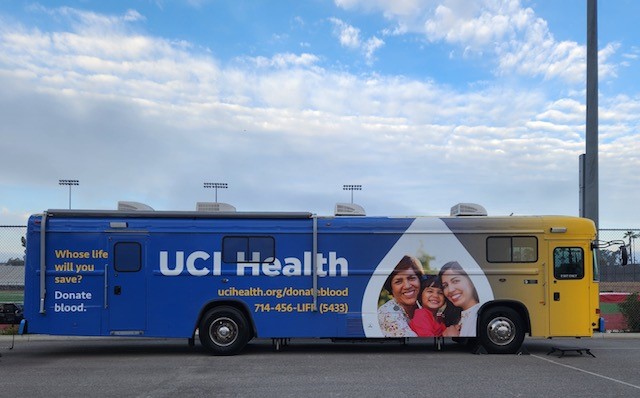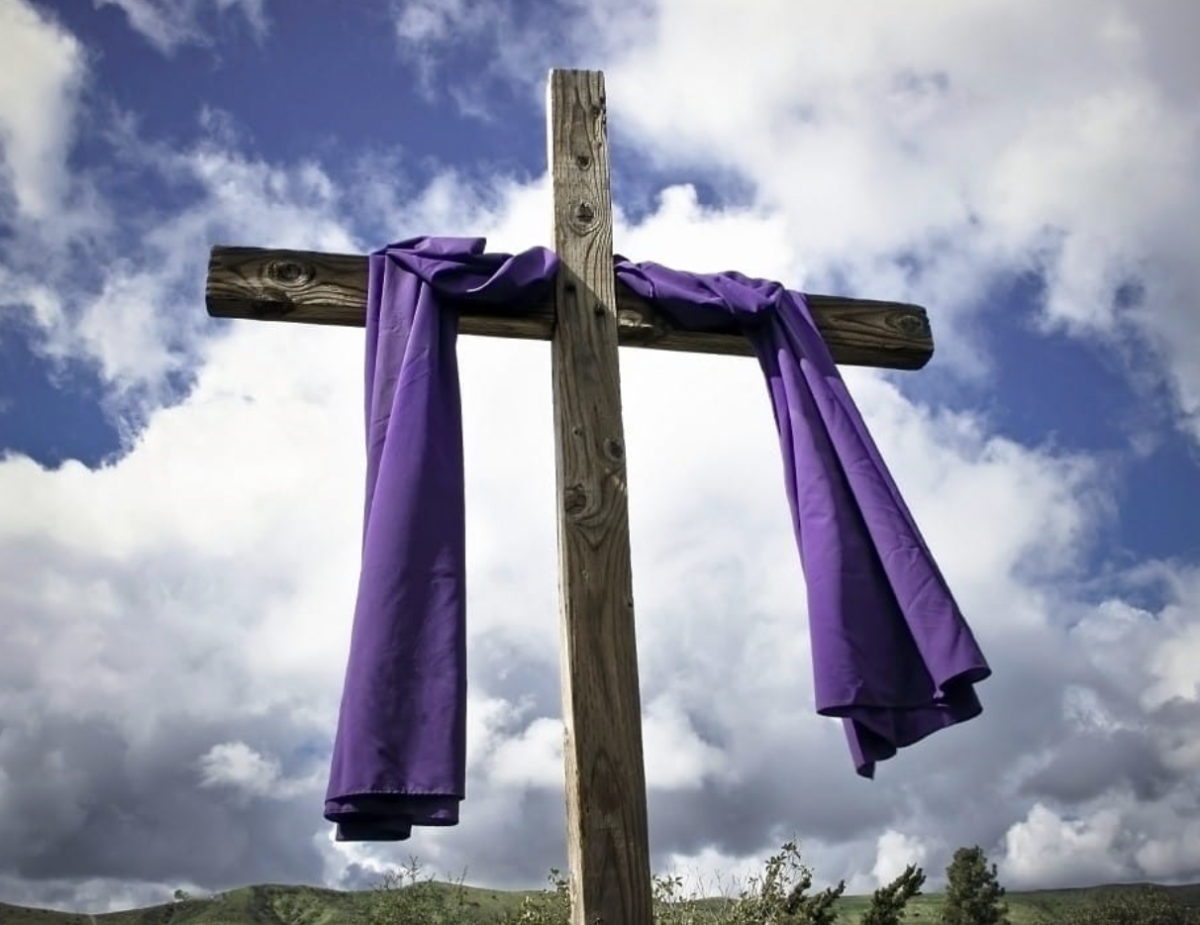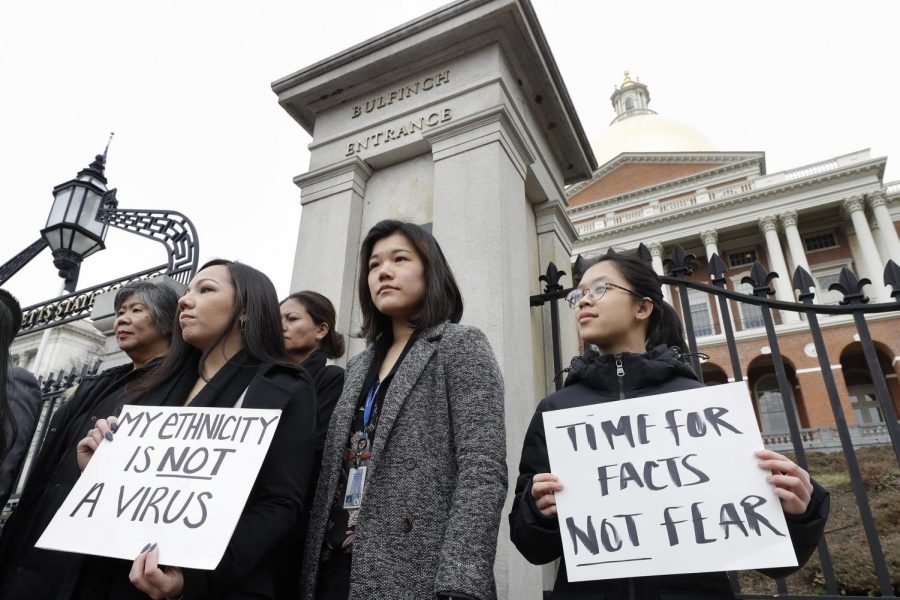“Kung Flu”: How Donald Trump’s Words are Still Inciting Violence
As little has been done when it comes to addressing the rise in hate crimes against Asian Americans, individuals from the Asian American Commission protest on the steps of the State House in Boston. Signs reading “My ethnicity is not a virus” and “Time for facts not fear” solidify the paramount need for accurate information surrounding the recent coronavirus pandemic.
February 16, 2021
Donald Trump officially left office back on January 20 of this year, but the harmful words he spewed during his term have not left with him. Back in the early stages of COVID-19 in the United States, when many were still unsure what the virus was and where it originated, Donald Trump popularized a xenophobic narrative. By referring to COVID-19 as the “Kung Flu” and the “Chinese Virus,” ex-President Trump placed the blame of a global pandemic upon an entire race, ultimately promoting hate towards innocent people.
When COVID-19 slowly took over our lives back in March of 2020, Stop AAPI (Asian American Pacific Islander) Hate began recording reports of discrimination against Asians, as the number of instances appeared to be rising. From March 19 to the end of 2020, Stop AAPI Hate received over 2,800 anti-Asian reports across 47 states. Similarly, Asian Americans Advancing Justice shared their recordings of hate against Asian Americans, reporting that from 2017 to 2019, there were less than 500 reports, but from February to December of last year, there were an estimated 3,000.
Since COVID has become the most prominent concern worldwide, there has been an obvious increase in hate against Asian Americans and Asians. Just in the past two weeks, multiple cases of physical violence against Asian Americans have ensued.
On January 28, 84-year-old Vicha Ratanapakdee was shoved to the ground while taking a walk in San Francisco. Ratanapakdee, a grandfather initially from Thailand, was simply walking in the driveway of a local neighborhood when the perpetrator violently sprinted towards him, knocking him to the ground. Devastatingly, Ratanapakdee died in the hospital two days later from the injuries he sustained in the attack (KTVU).
A few days later, on January 31, a video showed a man forcefully pushing a 91-year-old Asian man to the ground in Oakland’s Chinatown before harming two other victims. President of the Oakland Chinatown Chamber of Commerce, Carl Chan, explained to ABC News that “in recent weeks there’s been an uptick in violent attacks targeting Asian families, customers and store owners in Oakland’s Chinatown neighborhood.”
Following, on February 3, 61-year-old Noel Quintana was a passenger on the New York subway traveling to work when a man began repeatedly kicking his tote bag. When Quintana responded to this unwarranted kicking, the man slashed him across the face with a box cutter, causing him to get nearly 100 stitches (Asian Journal).
These incidents are a few among the thousands that have taken place since the coronavirus struck havoc around the world. Through these attacks, the common mantra that “words have power” has only received more validation. Despite his high level of power, Donald Trump ignorantly renamed the coronavirus pandemic, and as a result, encouraged animosity towards Asian Americans for something they too had no control over.

Trump helped this racist depiction of the coronavirus pick up traction, and now, individuals of Asian-decent feel unsafe in situations that they would typically feel perfectly comfortable in; walking down the street, riding on the subway, and for Yorba Linda High School student, Kaitlyn Kame (12), entering a cafe with her family.
Months ago, when quarantine was in its early days, Kaitlyn and her family strolled Laguna Beach, remaining faithful to the COVID guidelines at the time. A fun, COVID-friendly outing quickly turned threatening when they were harassed by a civilian because of their race. Kaitlyn explained that she “was with [her] mom and sister crossing the street to eat at Urth Caffe when a white male in a car rolled his window down and yelled ‘go back to your country’ and continued to curse at [them] for ‘starting the coronavirus.’” A place that Kaitlyn and her family often frequent quickly and unwantedly became dangerous.
Words should not be thrown around lightly, as they can ignite hate crimes countrywide. Former president, Donald Trump, has jeopardized the safety of an entire race, one that accounts for 5.6% of the U.S. population (HHS). There is no person or group to blame for this pandemic. Likewise, there is no such thing as the “Kung Flu” or “Chinese Virus.” Pinpointing a virus to one location when it has spread globally is dangerous and inaccurate, and only perpetuates the xenophobia that Asian individuals face daily.








































Sharon Sun • May 15, 2021 at 6:50 PM
It’s definitely something dangerous to say with the rise in anti-Asian sentiment due to Covid, so I still believe that we see this “Kung Flu” label continue to influence anti-Asian hate even after the former president has left the office. Great article Riley!
Anita Tun • Feb 28, 2021 at 9:49 AM
Thank you for writing about this topic! I think it is so important to educate oneself about the rise of Asian hate crimes happening during COVID-19 because people need to know how to prevent these incidents and to help victims.
Suhani Bhanvadia • Feb 21, 2021 at 11:53 AM
It’s so disappointing to see racism even after what happened in 2020. You would think people would be more careful about what they say/do, but unfortunately, they still don’t consider the harm they are causing.
danielle huizar • Feb 20, 2021 at 11:12 AM
This is an extremely important article, especially right now, and I loved how you included specific instances of violence against Asian Americans. When COVID-19 hit, I felt a lot of non-Asian Americans were putting blame on Asian Americans, and when Donald Trump decided to say “Kung Flu” and “Chinese Virus,” it made the blame on Asian Americans exponentially worse. From personal experience, when walking on a hike, I saw an Asian man be harassed and called slurs by a group of people, and as a partially Asian American, I felt horrible for the man and threatened by that experience. It is extremely unfortunate that Asian American hate crimes have risen exponentially, and these instances of a person of power blatantly using words to incite violence and its detrimental effect should be a lesson to those who are currently in power to be careful with their word choices.
Karina Shah • Feb 19, 2021 at 8:27 AM
This article is super appreciated. I enjoy how you talk about these struggles of the Asian Americans in depth with the causes and catalysts.
Tiana Salisbury • Feb 16, 2021 at 9:38 PM
Thank you for addressing this topic. It is amazing how someone’s words can affect so many people, but unfortunately in this case, not in a good way. I know people who have been called out for being Asian and it scares me. I hope people can realize that the coronavirus was not caused by one group of people and listen to facts instead of the words of one individual.